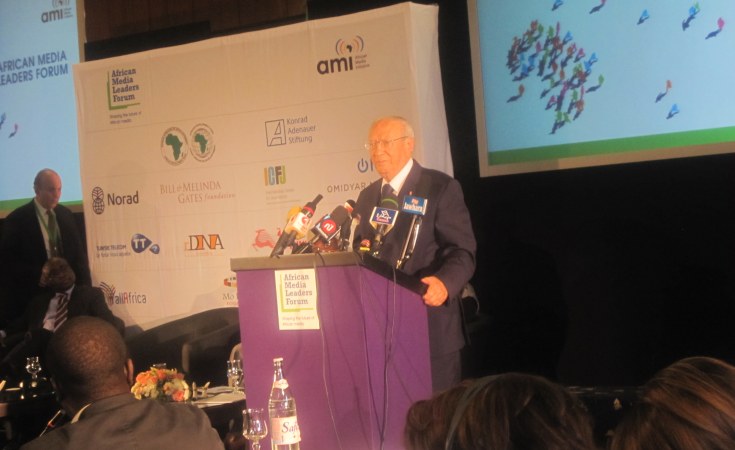Tunis — Tunisian Prime Minister Beji Caid el Sebsi says that a year after the uprising that launched "the Arab spring", the country is on the path to achieve the aims of the social media-fueled rebellion.
Addressing the fourth African Media Leaders Forum (AMLF), which has brought over 350 media owners and operators from 48 African countries to Tunis, el Sebsi said the Tunisian revolt "was unarmed, unorganized and leaderless. It had no ideological or religious basis and was not supported by foreign groups." Nevertheless, he said, "the regime of almost a quarter of a century disappeared."
In the wake of that transformation, inspired and informed by Twitter and other social media, Tunisia's print and broadcast media have multiplied.
From a single party state controlling information, there are now over a hundred newspapers and three television channels, two of them private enterprises.
In contrast to the former state-controlled broadcaster, el Sebsi said, the public station today sees itself as serving society rather than serving the government that funds it. "I can assure you," he said, "that the public TV station is harsher in its judgment of government actions than the private stations."
Even if a free press sometimes goes overboard, he said, those excesses are preferable to curbing freedom of expression. Independent media "can speak the truth about what is good and what is bad and let us know if we are not going in the right direction."
That is why AMLF is in Tunis this year, according to Amadou Mahtar Ba, CEO of the African Media Initiative, which convenes the annual forum.
"Media must at all times be on the side of the people," he told the opening session. "This meeting would not have been possible in Tunisia a year ago."
Holding a pan-African media meeting in a country where the people have been able to force their government towards transparency and accountability is appropriate for another reason, he said.
This year's forum will launch a code of conduct for media owners.
"Nowhere," Ba said, "have media owners been governed by a code of ethics as are the journalists who work for them."
The Tunisian prime minister declared his optimism about the future of popular movements for change. But he cautioned that the revolution is not complete.
"We have done our best to make sure this revolution would lead to democratic governance," he said. The evidence that Tunisia is on the right path "was the organization of free and fair elections."
The 23 October vote selected a parliament that will develop a new constitution. A future government will face daunting challenges.
"The Tunisian people, especially youth, were in despair," el Sebsi told the media audience. Unemployment is high and is concentrated among young people. Fourteen of Tunisia's 24 administrative areas "are in a dire economic situation," he said. "There is no infrastructure that would support development. We've had to start from scratch."
The revolutions underway to make governments everywhere more responsive to the needs of their citizens hold promise for the future, he said. "An appropriate framework and the right leadership can create a virtuous circle that leads to enduring democracy."
Donald Kaberuka, President of the African Development Bank, which is headquartered in Tunis, speaking after the prime minister, said that democracy is critical to material as well as political progress. "Lack of empowerment and inability to hold governments accountable," he said, "is the principle source of poverty."
He said it is possible for undemocratic governments to deliver economic results to their people, but that those results are not sustainable.
And he said suppression of media is one reason for the fragility of that model. "Where media is not free," he said, "is likely to be where corruption and kleptocracy prosper."
Following the forum's opening session, panels and presentations addressed questions that preoccupy delegates daily. Where are the audiences of the future? What are the revenue streams? How are mobile media disrupting distribution models?
At the final panel of the day, Jay Naidoo, a former South African cabinet minister and labor leader who works with the Global Alliance for Improved Nutrition, brought the conversation full circle to the opening session.
He asked the media professionals who blocks media them from doing their job. "Who is able to bully them - who is able to harass their staff and block their funding and close their operations?"
Politics, Naidoo said, is what is hampering media and holding back African development. "Governance is the chief driver of whether we will succeed or fail on this continent."


